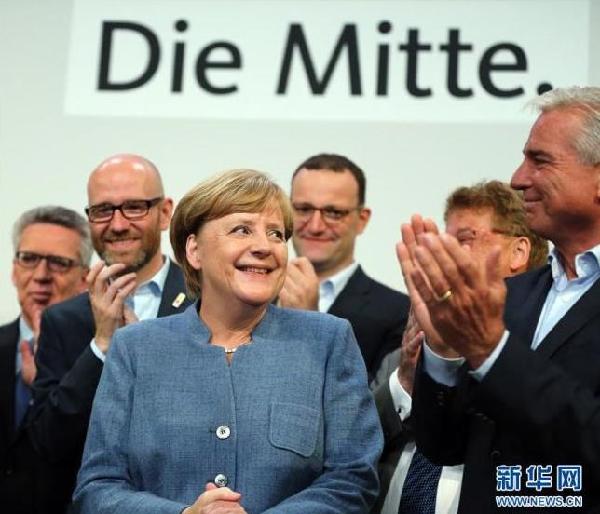Merkel's victory and challenges
- By Sajjad Malik
 0 Comment(s)
0 Comment(s) Print
Print E-mail China.org.cn, September 27, 2017
E-mail China.org.cn, September 27, 2017
Angela Merkel won her fourth straight election to clinch another term as German Chancellor. That the outcome of last Sunday's poll was in her favor was expected; however, there is a major surprise also, as the far-right Alternative for Germany (AfD) party gained 13 percent of the vote to enter parliament for the first time.
|
|
|
Christian Democratic Union CDU party leader and German Chancellor Angela Merkel reacts on first exit polls in the German general election (Bundestagswahl) in Berlin, Germany, Sept 24, 2017. [Photo/Xinhua] |
Merkel almost annihilated her main challenger, Social Democrat leader Martin Schultz, who gained a record low vote of about 21 percent, compared to the 33 percent for Merkel's conservative Christian Union (CDU/CSU).
Now aged 63, she has been in power for 12 years. The latest victory earned her unprecedented accolades, local media calling her the "eternal chancellor." She has also been praised outside Germany, with the New Yorker magazine labelling her "the most powerful woman in a world filled with unstable men."
However, although rightly termed as a powerful leader, she will have to address a number of domestic, regional and global challenges in the coming days to prove her leadership.
The rise of AfD as the third biggest party is one major domestic challenge. The fact that right-wing elements were able to garner a considerable chunk of votes while the country's economy is doing very well, shows their rise is not linked to economic conditions.
AfD has thrived on anti-immigration and anti-Islam sentiments at a time when a number of European nations are trying to control the rise of radical politicians. The continent is passing through a critical stage, with a dramatic swing towards ultra-right and nationalistic politics.
Recently, France faced a resurgent National Front led by Marine le Pen; however, the liberal and forward-looking ideas of Emmanuel Macron won the day. A similar effort by supporters of Geert Wilders was defeated by Dutch voters. We also saw British voters rejecting the UKIP brand of nationalistic politics.
The success of AfD is matter of concern due to the country's peculiar past. It shows that the triggers for spread of radical ideas in more prosperous societies differ from poor countries and a more focused approach is needed to check the further rightward drift of society.
The absence of powerful opposition in parliament and on the streets might take away the pressure on Merkel, but it is surely not good for the country in the long run. Weak opposition is a negative for democracy, as experience shows that fear of opposition is the strongest check on the vagaries of powerful leaders.
Another challenge for her government is to win support from rivals to get her an unlikely coalition. Being short of a majority, Merkel need new partners to run the government after the SPD ruled out participation.
Yet, despite many challenges, Merkel may not face any formidable threat to her leadership. The reason is simple: The economy is doing well and the chancellor has already successfully handled the issue of allowing immigrants from Syria and other Muslim countries to enter.
Nevertheless, she needs to come up with measures to prolong the era of economic prosperity and find ways to properly assimilate the flood of immigrants, otherwise her open-door policy will become an uneasy legacy.
She is still in good position to deal with the European issues. Having a good working relationship with Macron is an asset. With Britain still mired in EU-exit talks, which may drag on for years, Germany under Merkel can emerge as the leading European power on both the diplomatic and economic front.
Her role is also important in shaping European ties with a Trump-led United States as well as with Russia led by Vladimir Putin. She also needs to mend fences with Turkey and play role in creating peace in Ukraine. The issue of North Korea may also test her leadership in the coming days.
Merkel has the reputation of being a tough and calculated campaigner. The way she climbed to the top of political hierarchy says much for her grit and abilities. Her demand that then-chancellor Helmut Kohl should be dumped after a campaign scandal of 1999 shows that the "austerity queen" knows how to react when her moment comes.
Sajjad Malik is a columnist with China.org.cn. For more information please visit:
http://www.china.org.cn/opinion/SajjadMalik.htm
Opinion articles reflect the views of their authors, not necessarily those of China.org.cn.







Go to Forum >>0 Comment(s)